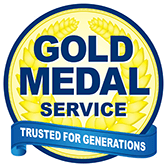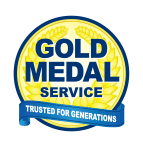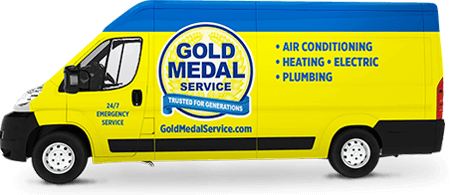
We wish each other peace, health, and happiness for the new year, but ironically, we are more likely to get sick and feel miserable during this time of year. This is in large part due to the increased exposure to airborne contaminants in our indoor environments.
According to the U.S. Environmental Protection Agency, Americans spend around 90% of their time indoors on average. During cold, winter weather, the percentage is closer to 99%. Complicating this is the fact that homes today are much more insulated than ever. While this is good for energy efficiency, it can be horrible for our health and wellbeing.
Due to increased time spent indoors, improved insulation, and increased use of chemical cleaners and air fresheners, indoor air quality is especially important during winter and the holiday season. Since indoor air is 2-5 times as polluted as the air outdoors, we should pay particular attention to the quality of the air we are breathing in our homes, especially during winter and the holidays.
Candles and Incense
While people love the sight and smell of a flickering candle, they can release smoke, airborne particulates, and volatile organic compounds (VOCs), which can contribute to poor indoor air quality. Scented candles are the worst, emitting chemicals that some say are worse than second-hand smoke. Also, some people are especially sensitive to the perfume scents and chemicals emitted by the candle.
Instead of using candles, consider battery-operated LED candles instead. They won’t create and soot stains and won’t fill up the house with chemicals and volatile organic compounds.
If you want a fresh scent or deodorizer that doesn’t add VOCs into the air, you can either create your own VOC-free air fresheners with essential oils and other ingredients or find a non-toxic, non-VOC freshener online or in-store (Simply Earth is one brand).
Incense is no better. According to a study by the Environmental Protection Agency, “exposure to incense smoke has been linked with several illnesses, and certain brands of incense also contain chemicals suspected of causing skin irritation.”
Avoid exposing yourself to the contaminants produced by candles and incense by using flameless, battery-operated candles and essential oils for your pleasant smells. If you
Air Fresheners and Household Cleaners
Many people use air fresheners to mask a smell. The best way to make your home or other indoor space smell better is to first get rid of the source of the smell first. This could be garbage, mold, or something more serious, such as a gas leak.
Warning: If you smell something like rotten eggs or sulfur, you don’t want to ignore it. A rotten egg-like smell can indicate a gas leak. Since natural gas is naturally odorless, tasteless, and colorless, gas manufactures are required to add a chemical called mercaptan that smells a lot like rotten eggs to help alert people to a gas leak. Burning plastic, sulfur, and rotten egg smells can also indicate a serious electrical hazard, such as burning plastic wires behind an outlet or switch. If you suspect a gas leak, evacuate the home immediately and call your local utility company or 911 from a safe distance. Then wait until a professional has deemed it safe for you to reenter the home.
Even after you have removed the source of the problem, however, some people still may want the added assistance from an air freshener. The problem is that many air fresheners release lots of chemicals that may smell good, but are filled with volatile organic compounds (VOCs), benzene, and formaldehyde, which can cause health problems. Especially if you have low ventilation, those chemicals stay in the home, aggravating respiratory problems (asthma, allergies, etc.), causing headaches and nausea, and have even been linked to neurological damage and cancer (Scientific American).
In addition to harmful chemicals like benzene and formaldehyde, many air fresheners and cleaners also emit airborne contaminants known as phthalates (f-THAL-lates), which can cause birth defects, hormonal and reproductive issues. According to a 2007 review by Natural Resources Defense Council (NRDC), 12 out of 14 widely available air fresheners contained phthalates (Scientific American).
While we know that phthalates are bad for our health, they are almost impossible to avoid. They are nearly ubiquitous in our hair spray, perfume, deodorant, and nearly everything that is fragrances. They are also commonly found in plastics, such as shower curtains, plastic toys, and raincoats.
While it’s nearly impossible to avoid phthalates altogether, one great way is to avoid fragrances. Look for natural air fresheners, cleaners, and labels like “phthalate-free,” “VOC-free,” “scented only with essential oils,” and “no synthetic fragrance.”
You can also naturally get rid of bad smells by wrapping cloves and cinnamon in cheesecloth and then boiling them in water.
Another way you can naturally clean the air and help get rid of offensive odors is by adding some air-cleaning houseplants to your home. Aloe vera, spider plants, Gerber daisies, and other plant species are great ways to naturally filter contaminants out of the air.
Click here for more ways to improve your indoor air quality.
If you must use a cleaner with phthalates and VOCs, make sure you open up a window or door to help ventilate the area. And instead of air fresheners
Learn more about natural, non-toxic air fresheners and household cleaners.
Hobbies and Crafts
If you have a hobby or craft that requires different solvents, paints, adhesives, and other sometimes-toxic materials, you want to make sure to work in a very well-ventilated area. With some products, you will want to work outdoors and wear a ventilation mask.
Make sure you read the ingredients and instructions before use. Most aerosols contain VOCs that you don’t want to release into your living spaces. If you are using a VOC product indoors, make sure you have adequate ventilation by opening windows, using exhaust fans, and running your HVAC system, which will help circulate the air.
Ventilation Solutions
It’s best to avoid VOCs entirely, but sometimes that’s not possible. Regardless of how careful you are to avoid VOCs in your home, it’s important to have sufficient ventilation in your home.
Whenever you make any significant insulation and air sealing improvements in your home, make sure you contact a professional HVAC expert to analyze your insulation and ventilation levels.
Our HVAC technicians will be able to inspect your heat recovery ventilator (if you have one), as well as HVAC, kitchen, and bathroom exhaust systems for proper operation. If your exhaust fans make a lot of noise and don’t actually vent anything out of the home, contact your local home service expert.
Regularly Change Air Filters
Your HVAC air filter is extremely important when it comes to improving indoor air quality. Instead of using the cheapest air filters you can find, spend a little bit more on a more effective air filter.
As a general rule, the higher the MERV (minimum efficiency reporting value) rating of the filter, the better the filter is at capturing and removing airborne pollutants. We recommend purchasing an air filter with a minimum MERV rating of 7.
Learn more about MERV ratings and our Air Filters.
Remember to check your air filter every 30 days, and wait no longer than 90 days to replace it. Homes with more dust, dander, pollen, hair, and mold spores should change their air filters more frequently.
Professional Indoor Air Quality Solutions
For the best indoor air quality, you will want to speak with a professional HVAC Indoor Air Quality Specialist. Contact Gold Medal Service for affordable and effective solutions to combat airborne pollutants and poor indoor air quality.
We highly recommend a whole-home air purification system that is installed directly into your existing HVAC ductwork for households that suffer from allergies, asthma, sinuses, and frequent illness. In addition to improving the health and wellbeing of everyone inside, they also help keep your HVAC system efficient, reducing the need for maintenance, repairs, and replacements.
Here are some of the Indoor Air Quality products we offer:
- HEPA Filters
- UV Germicidal Lights
- Lennox PureAir Air Purification system
- Phenomenal Aire Air Purification system
- Media Filters
- Whole-Home Dehumidifiers
- Whole-Home Humidifiers
- Bypass Humidifiers
If you don’t have an indoor air purifier or air cleaner to help you clean, scrub, and kill your indoor contaminants, you will be susceptible to all the indoor contaminants in your home.
Remember that air filters can only capture the largest airborne particles. Most airborne contaminants pass right through. In order to actually clean and purify the air, you will want to speak with a professional about more effective IAQ solutions, such as UV air irradiation and air scrubbers.
Conclusion
Indoor air quality is always important, but especially during the winter months and around the holidays. Asthma, respiratory problems, sinus complaints, illness, colds, and the flu increase during winter.
By taking the proper steps to combat poor indoor air quality, avoid toxic products, increasing ventilation, and speaking with a professional HVAC expert, you can make your home a safer, healthier, and more comfortable place for you and your loved ones.
Wishing you health and happiness this holiday season and in the year to come!
Take the safety, health, happiness wishes for the New Year seriously by contacting Gold Medal Service today.
Give us a call now at 1-732-638-4317


